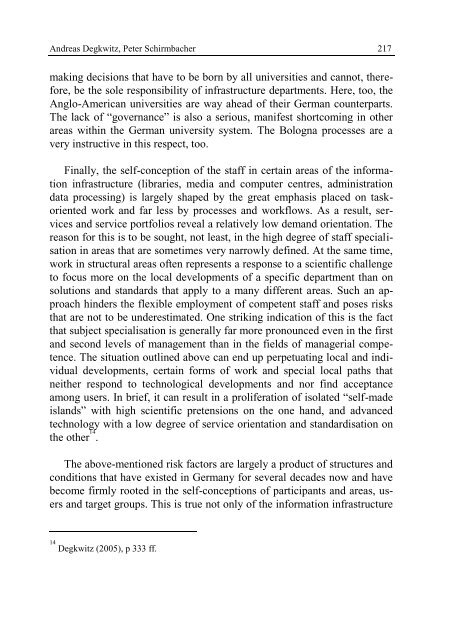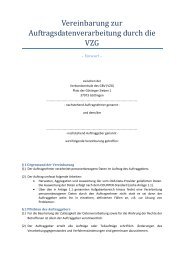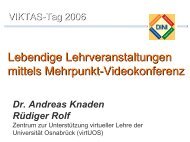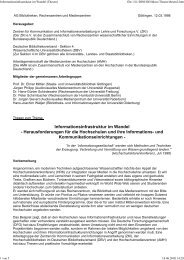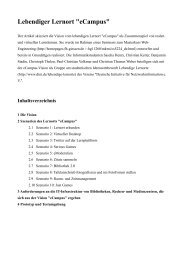- Seite 1 und 2:
�����������
- Seite 3 und 4:
Impressum: DINI - Deutsche Initiati
- Seite 5 und 6:
Editorial In der vorliegenden Publi
- Seite 7 und 8:
Hartmut Koke, Sebastian Rieger GÖ*
- Seite 9 und 10:
- Modell 1: Koordination durch eine
- Seite 11 und 12:
Andreas Degkwitz, Peter Schirmbache
- Seite 13 und 14:
Andreas Degkwitz, Peter Schirmbache
- Seite 15 und 16:
Andreas Degkwitz, Peter Schirmbache
- Seite 17 und 18:
Andreas Degkwitz, Peter Schirmbache
- Seite 19 und 20:
Andreas Degkwitz, Peter Schirmbache
- Seite 21 und 22:
Andreas Degkwitz, Peter Schirmbache
- Seite 23 und 24:
Andreas Degkwitz, Peter Schirmbache
- Seite 25 und 26:
Andreas Degkwitz, Peter Schirmbache
- Seite 27 und 28:
Ulrich Hohoff, Leopold Eichner 27 b
- Seite 29 und 30:
Ulrich Hohoff, Leopold Eichner 29 -
- Seite 31 und 32:
Ulrich Hohoff, Leopold Eichner 31 F
- Seite 33 und 34:
Ulrich Hohoff, Leopold Eichner 33 K
- Seite 35 und 36:
Ulrich Hohoff, Leopold Eichner 35 D
- Seite 37 und 38:
Ulrich Hohoff, Leopold Eichner 37 E
- Seite 39 und 40:
Ulrich Hohoff, Leopold Eichner 39 6
- Seite 41 und 42:
Peter Schirmbacher 41 dend, stehen
- Seite 43 und 44:
Peter Schirmbacher 43 das den Namen
- Seite 45 und 46:
Peter Schirmbacher 45 elektronisch
- Seite 47 und 48:
Peter Schirmbacher 47 tät ermögli
- Seite 49 und 50:
Peter Schirmbacher 49 und Computer-
- Seite 51 und 52:
Peter Schirmbacher 51 bekommen. Das
- Seite 53 und 54:
Frank Klapper, Norbert Lossau 53 IK
- Seite 55 und 56:
Frank Klapper, Norbert Lossau 55 te
- Seite 57 und 58:
Frank Klapper, Norbert Lossau 57 Ab
- Seite 59 und 60:
Frank Klapper, Norbert Lossau 59 5.
- Seite 61 und 62:
Frank Klapper, Norbert Lossau 61 Au
- Seite 63 und 64:
Frank Klapper, Norbert Lossau 63 6.
- Seite 65 und 66:
Frank Klapper, Norbert Lossau 65 Ak
- Seite 67 und 68:
Frank Klapper, Norbert Lossau 67 Gr
- Seite 69 und 70:
Andreas Degkwitz 69 25%. Mit den Fa
- Seite 71 und 72:
Andreas Degkwitz 71 Frontoffice: Mi
- Seite 73 und 74:
Andreas Degkwitz 73 dass die neuen
- Seite 75 und 76:
Andreas Degkwitz 75 - Interdiszipli
- Seite 77 und 78:
Andreas Degkwitz 77 Im Rahmen der S
- Seite 79 und 80:
Steffi Engert, Uwe Blotevogel 79 In
- Seite 81 und 82:
Steffi Engert, Uwe Blotevogel 81 Fa
- Seite 83 und 84:
Steffi Engert, Uwe Blotevogel 83 -
- Seite 85 und 86:
Steffi Engert, Uwe Blotevogel 85 -
- Seite 87 und 88:
Steffi Engert, Uwe Blotevogel 87 Di
- Seite 89 und 90:
Steffi Engert, Uwe Blotevogel 89 Zu
- Seite 91 und 92:
Steffi Engert, Uwe Blotevogel 91 Di
- Seite 93 und 94:
Steffi Engert, Uwe Blotevogel 93 -
- Seite 95 und 96:
Hartmut Koke, Sebastian Rieger 95 2
- Seite 97 und 98:
Hartmut Koke, Sebastian Rieger 97 B
- Seite 99 und 100:
Hartmut Koke, Sebastian Rieger 99 r
- Seite 101 und 102:
Hartmut Koke, Sebastian Rieger 101
- Seite 103 und 104:
Hartmut Koke, Sebastian Rieger 103
- Seite 105 und 106:
Hartmut Koke, Sebastian Rieger 105
- Seite 107 und 108:
Hartmut Koke, Sebastian Rieger 107
- Seite 109 und 110:
Hartmut Koke, Sebastian Rieger 109
- Seite 111 und 112:
Hartmut Koke, Sebastian Rieger 111
- Seite 113 und 114:
Hartmut Koke, Sebastian Rieger 113
- Seite 115 und 116:
Hartmut Koke, Sebastian Rieger 115
- Seite 117 und 118:
Wilfried Juling, Hannes Hartenstein
- Seite 119 und 120:
Wilfried Juling, Hannes Hartenstein
- Seite 121 und 122:
Wilfried Juling, Hannes Hartenstein
- Seite 123 und 124:
Wilfried Juling, Hannes Hartenstein
- Seite 125 und 126:
Wilfried Juling, Hannes Hartenstein
- Seite 127 und 128:
Wilfried Juling, Hannes Hartenstein
- Seite 129 und 130:
Wilfried Juling, Hannes Hartenstein
- Seite 131 und 132:
Rolf Borgeest, Andrea Bör 131 ca.
- Seite 133 und 134:
Rolf Borgeest, Andrea Bör 133 Abbi
- Seite 135 und 136:
Rolf Borgeest, Andrea Bör 135 - HI
- Seite 137 und 138:
Rolf Borgeest, Andrea Bör 137 ge,
- Seite 139 und 140:
Rolf Borgeest, Andrea Bör 139 9. Z
- Seite 141 und 142:
Bettina Böhm, Wilhelm Held, Beate
- Seite 143 und 144:
Bettina Böhm, Wilhelm Held, Beate
- Seite 145 und 146:
Bettina Böhm, Wilhelm Held, Beate
- Seite 147 und 148:
Bettina Böhm, Wilhelm Held, Beate
- Seite 149 und 150:
Bettina Böhm, Wilhelm Held, Beate
- Seite 151 und 152:
Bettina Böhm, Wilhelm Held, Beate
- Seite 153 und 154:
Christine Gläser, Hans-Joachim Wä
- Seite 155 und 156:
Christine Gläser, Hans-Joachim Wä
- Seite 157 und 158:
Christine Gläser, Hans-Joachim Wä
- Seite 159 und 160:
Christine Gläser, Hans-Joachim Wä
- Seite 161 und 162:
Christine Gläser, Hans-Joachim Wä
- Seite 163 und 164:
Christine Gläser, Hans-Joachim Wä
- Seite 165 und 166: Christine Gläser, Hans-Joachim Wä
- Seite 167 und 168: Christine Gläser, Hans-Joachim Wä
- Seite 169 und 170: Christine Gläser, Hans-Joachim Wä
- Seite 171 und 172: Hans Peter Großmann 171 den. Frei
- Seite 173 und 174: Hans Peter Großmann 173 Neben den
- Seite 175 und 176: Hans Peter Großmann 175 lung von I
- Seite 177 und 178: Hans Peter Großmann 177 vorhandene
- Seite 179 und 180: Hans Peter Großmann 179 5.3. Erzie
- Seite 181 und 182: Hans Peter Großmann 181 Abbildung
- Seite 183 und 184: Hans Peter Großmann 183 die es jed
- Seite 185 und 186: Hans Peter Großmann 185 kations- u
- Seite 187 und 188: Auswahlbibliographie 1 187 AG Bibli
- Seite 189 und 190: 189 in universities - the convergen
- Seite 191 und 192: 191 Gaughan, Thomas B. (1990): Budg
- Seite 193 und 194: 193 marriages between academic libr
- Seite 195 und 196: 195 Quetting, Katrin (2003): Konver
- Seite 197 und 198: 197 Autorenverzeichnis Uwe Blotevog
- Seite 199 und 200: Prof. Dr. Hartmut Koke, Stellvertre
- Seite 201 und 202: �����������
- Seite 203 und 204: Contents Sabine Wefers Spokeswoman
- Seite 205 und 206: Preface by Sabine Wefers Spokeswoma
- Seite 207 und 208: Andreas Degkwitz, Peter Schirmbache
- Seite 209 und 210: Andreas Degkwitz, Peter Schirmbache
- Seite 211 und 212: Andreas Degkwitz, Peter Schirmbache
- Seite 213 und 214: Andreas Degkwitz, Peter Schirmbache
- Seite 215: Andreas Degkwitz, Peter Schirmbache
- Seite 219 und 220: Andreas Degkwitz, Peter Schirmbache
- Seite 221 und 222: Andreas Degkwitz, Peter Schirmbache
- Seite 223 und 224: Ulrich Hohoff, Leopold Eichner 223
- Seite 225 und 226: Ulrich Hohoff, Leopold Eichner 225
- Seite 227 und 228: Ulrich Hohoff, Leopold Eichner 227
- Seite 229 und 230: Ulrich Hohoff, Leopold Eichner 229
- Seite 231 und 232: Ulrich Hohoff, Leopold Eichner 231
- Seite 233 und 234: Ulrich Hohoff, Leopold Eichner 233
- Seite 235 und 236: Ulrich Hohoff, Leopold Eichner 235
- Seite 237 und 238: Ulrich Hohoff, Leopold Eichner 237
- Seite 239 und 240: Peter Schirmbacher 239 A characteri
- Seite 241 und 242: Peter Schirmbacher 241 most diverse
- Seite 243 und 244: Peter Schirmbacher 243 of their loc
- Seite 245 und 246: Peter Schirmbacher 245 6. Decision
- Seite 247 und 248: Peter Schirmbacher 247 with the exi
- Seite 249 und 250: Peter Schirmbacher 249 ning of this
- Seite 251 und 252: Frank Klapper, Norbert Lossau 251 u
- Seite 253 und 254: Frank Klapper, Norbert Lossau 253 B
- Seite 255 und 256: Frank Klapper, Norbert Lossau 255 s
- Seite 257 und 258: Frank Klapper, Norbert Lossau 257 q
- Seite 259 und 260: Frank Klapper, Norbert Lossau 259 F
- Seite 261 und 262: Frank Klapper, Norbert Lossau 261 -
- Seite 263 und 264: Frank Klapper, Norbert Lossau 263 1
- Seite 265 und 266: Andreas Degkwitz 265 engineering an
- Seite 267 und 268:
Andreas Degkwitz 267 Front office:
- Seite 269 und 270:
Andreas Degkwitz 269 tial that acti
- Seite 271 und 272:
Andreas Degkwitz 271 The BMBF proje
- Seite 273 und 274:
Andreas Degkwitz 273 10. Acknowledg
- Seite 275 und 276:
Steffi Engert, Uwe Blotevogel 275 a
- Seite 277 und 278:
Steffi Engert, Uwe Blotevogel 277 A
- Seite 279 und 280:
Steffi Engert, Uwe Blotevogel 279 r
- Seite 281 und 282:
Steffi Engert, Uwe Blotevogel 281 T
- Seite 283 und 284:
Steffi Engert, Uwe Blotevogel 283 I
- Seite 285 und 286:
Steffi Engert, Uwe Blotevogel 285 T
- Seite 287 und 288:
Steffi Engert, Uwe Blotevogel 287 n
- Seite 289 und 290:
Hartmut Koke, Sebastian Rieger 289
- Seite 291 und 292:
Hartmut Koke, Sebastian Rieger 291
- Seite 293 und 294:
Hartmut Koke, Sebastian Rieger 293
- Seite 295 und 296:
Hartmut Koke, Sebastian Rieger 295
- Seite 297 und 298:
Hartmut Koke, Sebastian Rieger 297
- Seite 299 und 300:
Hartmut Koke, Sebastian Rieger 299
- Seite 301 und 302:
Hartmut Koke, Sebastian Rieger 301
- Seite 303 und 304:
Hartmut Koke, Sebastian Rieger 303
- Seite 305 und 306:
Hartmut Koke, Sebastian Rieger 305
- Seite 307 und 308:
Hartmut Koke, Sebastian Rieger 307
- Seite 309 und 310:
Hartmut Koke, Sebastian Rieger 309
- Seite 311 und 312:
Wilfried Juling, Hannes Hartenstein
- Seite 313 und 314:
Wilfried Juling, Hannes Hartenstein
- Seite 315 und 316:
Wilfried Juling, Hannes Hartenstein
- Seite 317 und 318:
Wilfried Juling, Hannes Hartenstein
- Seite 319 und 320:
Wilfried Juling, Hannes Hartenstein
- Seite 321 und 322:
Wilfried Juling, Hannes Hartenstein
- Seite 323 und 324:
Rolf Borgeest, Andrea Bör 323 The
- Seite 325 und 326:
Rolf Borgeest, Andrea Bör 325 Figu
- Seite 327 und 328:
Rolf Borgeest, Andrea Bör 327 Tech
- Seite 329 und 330:
Rolf Borgeest, Andrea Bör 329 cour
- Seite 331 und 332:
Rolf Borgeest, Andrea Bör 331 The
- Seite 333 und 334:
Bettina Böhm, Wilhelm Held, Beate
- Seite 335 und 336:
Bettina Böhm, Wilhelm Held, Beate
- Seite 337 und 338:
Bettina Böhm, Wilhelm Held, Beate
- Seite 339 und 340:
Bettina Böhm, Wilhelm Held, Beate
- Seite 341 und 342:
Bettina Böhm, Wilhelm Held, Beate
- Seite 343 und 344:
Bettina Böhm, Wilhelm Held, Beate
- Seite 345 und 346:
Christine Gläser, Hans-Joachim Wä
- Seite 347 und 348:
Christine Gläser, Hans-Joachim Wä
- Seite 349 und 350:
Christine Gläser, Hans-Joachim Wä
- Seite 351 und 352:
Christine Gläser, Hans-Joachim Wä
- Seite 353 und 354:
Christine Gläser, Hans-Joachim Wä
- Seite 355 und 356:
Christine Gläser, Hans-Joachim Wä
- Seite 357 und 358:
Christine Gläser, Hans-Joachim Wä
- Seite 359 und 360:
Christine Gläser, Hans-Joachim Wä
- Seite 361 und 362:
Hans Peter Großmann 361 in favor o
- Seite 363 und 364:
Hans Peter Großmann 363 Together w
- Seite 365 und 366:
Hans Peter Großmann 365 infrastruc
- Seite 367 und 368:
Hans Peter Großmann 367 but the in
- Seite 369 und 370:
Hans Peter Großmann 369 5.3. Achie
- Seite 371 und 372:
Hans Peter Großmann 371 all-inclus
- Seite 373 und 374:
Hans Peter Großmann 373 making the
- Seite 375:
Hans Peter Großmann 375 the integr
- Seite 378 und 379:
378 Borgeest, Rolf (2006): In: Hoch
- Seite 380 und 381:
380 Field, Clive D. (2001): Theory
- Seite 382 und 383:
382 Hawkins, Brian L.; Battin, Patr
- Seite 384 und 385:
384 Kommission für Rechenanlagen (
- Seite 386 und 387:
386 Supra, John R.; Zebrowski, Judy
- Seite 388 und 389:
388 Christine Gläser, Mitglied des
- Seite 390:
390 Hans-Joachim Wätjen, Vorsitzen


